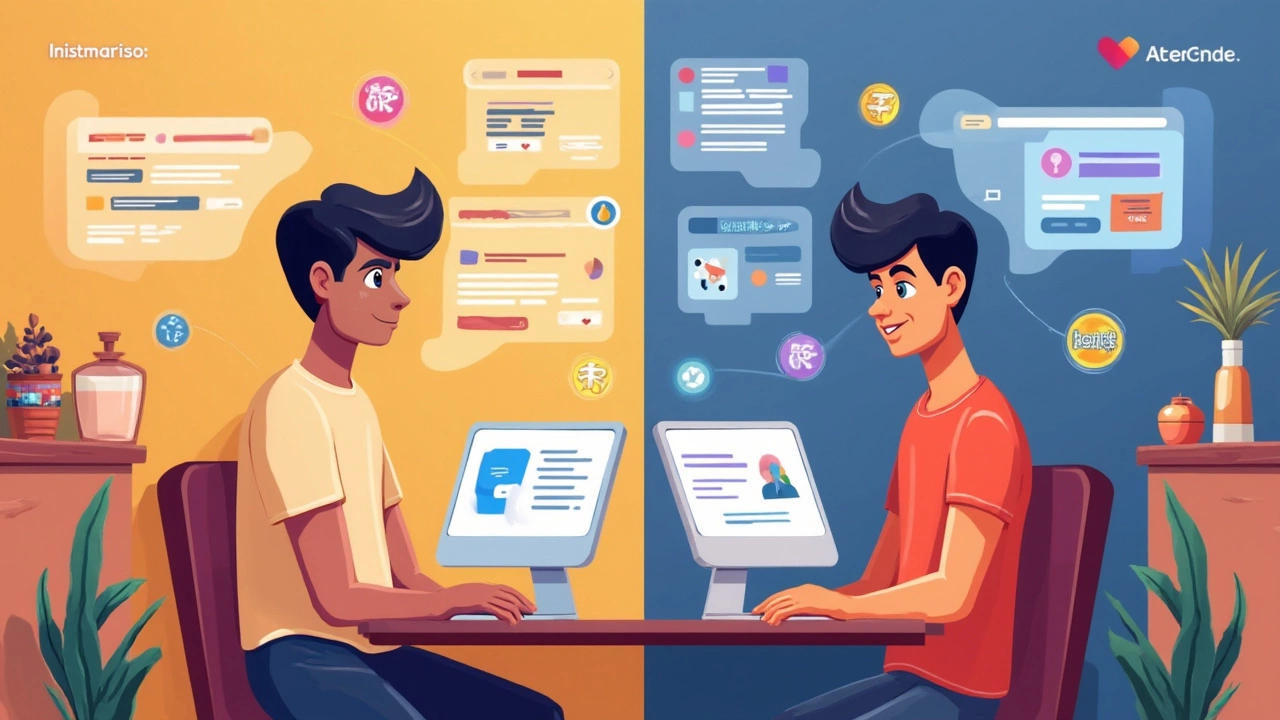
If you're learning to code for the first time, picking the right platform isn't just a detail—it's the difference between loving it and giving up before your first project compiles. The right website or app can turn complicated ideas into stuff you actually get. The wrong one? It’ll make things so confusing that you start doubting whether you ever liked tech to begin with.
Most beginners jump from site to site, confused by terms and overwhelmed by options. They spend too much time trying to find the 'perfect' place and not enough time actually coding. If this sounds familiar, you’re definitely not alone. I’ve been there, and so has pretty much everyone I know who codes today. There’s a trick to making your learning curve much smoother—and it starts with where you code.
- Why Platform Choice Makes a Big Difference
- Top Coding Platforms for Absolute Beginners
- Features that Actually Matter When You’re Starting Out
- Dealing with Challenges: What Traps to Avoid
- Tips to Grow from Zero to Confident Coder
Why Platform Choice Makes a Big Difference
Learning to code isn’t just about picking up a language—it’s about feeling confident enough to keep going when stuff gets tricky. The platform you choose can be the make-or-break factor in whether you push through the tough parts or end up quitting. Picking the right coding platform means you get quality resources, solid support, and clear feedback as you practice, which makes sticking with it way more likely.
Certain platforms focus on hand-holding step-by-step, while others just throw you into the deep end. A beginner learning Python on Codecademy, for example, is likely to move through lessons faster because of instant code checking and easy explanations. Meanwhile, someone jumping into free-form environments like GitHub for their first go might feel totally lost and never even finish the “Hello, World!” tutorial.
Here’s a quick snapshot of how platform choice actually shakes out for beginners:
| Platform | Completion Rate (Beginner Users) | Type of Feedback | Support |
|---|---|---|---|
| Codecademy | 56% | Instant, step-based | Forum, FAQs |
| Khan Academy | 63% | Hints, instant results | Moderated Q&A |
| Udemy (Self-paced) | 37% | Video, quizzes | Instructor messages |
| LeetCode | 18% | Test cases, solutions | Forum only |
That “Completion Rate” column isn’t just a boring data point—it’s a window into how well beginners survive their first weeks. Most new coders give up within the first ten days if the platform is too technical or doesn’t provide enough feedback. If you’re just starting, features like instant results, beginner-focused explanations, and strong support really matter more than you think.
There’s also a money angle. Some sites offer free basic tracks, but sneak paywalls or pricey pro tiers as you get even a little advanced. Others bundle certifications or cool projects as you go up. It’s smart to know if you’ll hit a paywall before you get hooked on a certain style of learning.
Here’s what to think about before settling in with a platform:
- Does it teach at your pace, from absolute basics to real projects?
- Is feedback fast and clear, or do you have to figure out errors on your own?
- Are there active forums or support, or are you basically on your own?
- Can you try before you buy, or do they want your card up front?
Finding answers here will save you hours, money, and a lot of anxiety. Trust me—if you start out somewhere friendly, simple, and well-supported, you’re much more likely to stick with coding for the long haul.
Top Coding Platforms for Absolute Beginners
Honestly, if you’re just starting out, it’s easy to get lost in the sea of coding websites. But only a few stand out for absolute beginners because they mix hand-holding guidance, practice, and real-world support. Here's a breakdown of the most popular platforms and how they stack up when it comes to getting started with coding.
Codecademy is probably the most well-known name for beginner coders. Their lessons are interactive, meaning you type code in your browser and see results right away. You can start with Python, JavaScript, or HTML/CSS, and their free tier has enough content to get you moving. The interface doesn’t overwhelm you with jargon. They also have paid ‘Pro’ features if you want practice projects or quizzes, but if you’re just feeling things out, free is fine.
FreeCodeCamp has helped millions (no exaggeration) learn to code from scratch, without charging a dime. Their curriculum covers the basics and then moves to projects, like building websites or simple games. There’s a huge community, so if you’re stuck, help is a forum post away. They even give out free certificates when you finish a big chunk of tasks. This platform’s edge is how much hands-on practice you get, rather than just reading theory.
Scratch, made by MIT, is a little different. Instead of writing code, you drag colorful blocks to snap together logic, kind of like LEGO for your brain. It’s aimed at complete beginners (including kids), but even adults find it fun when they’re anxious about ‘real’ code. If seeing text scares you, Scratch will calm those nerves and teach you logic first.
If you want something extra social, Code.org has partnered with schools and runs cool hour-of-code events. Their visual lessons explain concepts with games, videos, and little challenges so you don’t get bored. While some of their stuff is built for classrooms, anyone can sign up and go at their own pace.
Curious how these options compare? Here’s a simple table with some handy details:
| Platform | Best For | Languages/Learning Style | Cost | Community Support |
|---|---|---|---|---|
| Codecademy | Self-paced, hands-on practice | Python, JS, HTML/CSS, more | Free + Paid Pro | Medium – Forums & Peer Help |
| FreeCodeCamp | Loads of practice, real projects | HTML/CSS, JS, Python, APIs | Free | Strong – Huge Forum |
| Scratch | Super beginners & visual learners | Block-based (no text coding) | Free | Active Community |
| Code.org | Gamified, fun learning | Block-based + basic text | Free | Good – For Students & Solo |
One last thing: Don’t obsess over the ‘right’ platform. Pick one that speaks your language—literally and figuratively. If Python excites you, go with a site that starts there. If code looks intimidating, try something visual first. With these platforms, you’re in safe hands whichever way you start your coding journey.

Features that Actually Matter When You’re Starting Out
There are a million shiny websites out there claiming they’ll make you a coding genius. But when you’re just starting, you don’t need every bell and whistle. What you really want are a few things that actually make learning stick and keep you moving forward.
The first thing you’ll notice is how the interface looks and feels. If it’s too busy or crammed with options, it’ll slow you down. The best coding platforms for beginners have a clean workspace, clear instructions, and usually stick to one main thing on the screen at a time. Sites like Codecademy and freeCodeCamp nail this by walking you through code on one side while explaining details in simple English on the other.
Interactive feedback is another major plus. It sounds basic, but getting told right away if you mess up (and how to fix it) locks in learning fast. For example, freeCodeCamp shows you errors in real-time, so you don’t wonder for hours what went wrong. It’s better than old-school textbooks or even some YouTube videos that leave you confused.
Another must? Built-in progress tracking and bite-sized lessons. Platforms like Khan Academy or SoloLearn break learning into small, clear steps. Little wins keep you going. Their badges or progress bars sound cheesy, but they’re a legit motivator when you’re halfway through a tough week or losing steam.
- Simplicity: Can you find stuff quickly, or do you feel lost?
- Instant feedback: Does the platform tell you what’s wrong and how to fix it?
- Project-based learning: Are there small projects or challenges to build real skills?
- Language options: Are you forced to learn JavaScript, or can you explore others like Python (which most beginners love)?
- Cost and access: Is the best content behind a paywall, or do you get solid free learning?
Lastly, community support is underrated. A solid Q&A section or forum can save you when you hit a weird error at midnight. Sites like Stack Overflow or even the platform’s own community go a long way. When Aisha first started with Python, she ended up using a forum to fix a bug she couldn’t crack for days—it’s way better than getting stuck alone.
So, don’t chase after platforms with every possible feature. Look for clean design, real-time feedback, clear progress, flexible languages, fair pricing, and a helpful community. That’s your starter kit for coding that actually sticks.
Dealing with Challenges: What Traps to Avoid
Learning code is exciting, but it's also easy to mess up in ways that kill your motivation. The most common trap? Trying to learn everything at once. It’s tempting to sign up for courses in four languages, bounce between tutorials, and bookmark every resource. The result? You end up nowhere. Sticking to one coding platform and focusing on one language (like Python or JavaScript) helps your brain make connections faster.
Lots of folks also fall into the "copy-paste" habit. It feels good to see your program run, but if you aren’t typing things out and making mistakes, the info just doesn’t stick. A 2022 Coursera learner survey found that students who typed out their code solved 40% more problems correctly on later exercises, compared to the ones who mostly pasted answers.
Another thing to watch: Overvaluing badges or streaks. Sites like Codecademy, freeCodeCamp, and Khan Academy love to gamify your progress, but chasing streaks can distract you from actually understanding the material. It’s way better to slow down, redo tough challenges, and spend time on "why did this break?" moments.
- Don’t get sucked into complex, advanced projects too soon. Master the basics—variables, loops, and functions—before building an app or game.
- If a contest or leaderboard stresses you out, ignore it. Coding is not a race.
- Ask questions in forums or discussion boards; even silly mistakes happen to everyone, even after years of coding.
Here's a quick look at how beginners struggle, according to user feedback from three major platforms in 2024:
| Platform | Top Beginner Challenge | % Learners Struggling |
|---|---|---|
| Codecademy | Switching languages too soon | 53% |
| freeCodeCamp | Trying to complete all modules fast | 47% |
| Coursera | Relying too much on video answers | 36% |
Finally, don’t be afraid of hitting a wall. Struggle means you’re actively learning. I always tell friends—and Aisha will back me up on this—when stuck, it’s okay to take a walk, ask for help, or come back to it tomorrow. Progress is the goal, not perfection.

Tips to Grow from Zero to Confident Coder
Those first few weeks of coding can feel like you're lost in another country, but it does get easier if you stick to a plan. Here’s what helped me and a bunch of new coders I know cross that beginner-to-okay stage.
- Pick one language and stick with it for a while. Don’t bounce between Python, JavaScript, and Java every week. Python is usually the chillest for beginners, mostly because the code actually looks like English, and there are tons of simple tutorials.
- Practice real problems—don’t just read or watch. Code every single day, even if it's 15 minutes. One study from Codecademy showed students who practiced daily finished courses at double the rate of casual users.
- Don’t skip the basics. Seriously. Loops, conditionals, and variables might seem boring, but they pop up everywhere. Nail them and everything else gets easier.
- Make tiny projects, not massive ones. Build a calculator, a to-do list, or a personal website. Small wins boost your confidence and give you stuff to show off.
- Ask for help early. Stack Overflow, Reddit’s r/learnprogramming, or even the built-in communities on coding platforms will save hours of frustration.
One thing folks forget? Coding platforms have built-in streak features and badges. Sounds cheesy, but the dopamine rush keeps you coming back. For beginners, Code.org’s users with 14-day streaks had a 72% higher completion rate. Here’s a quick peek at some platform stats:
| Platform | Language Options | Streak/Reward Feature | Completion Rate (14+ days active) |
|---|---|---|---|
| Code.org | Block, Python, JavaScript | Badges/Streaks | 72% |
| Codecademy | Python, JavaScript, many more | Streaks | 48% |
| freeCodeCamp | JavaScript, HTML/CSS | Certificates | 42% |
The main thing is to keep showing up and keep your expectations realistic. Nobody goes from zero to senior developer in a month. If you aim for progress, not perfection, you’ll be shocked at how quickly you pick things up. And hey, even if you have a day where you totally bomb a problem (been there, done that), just keep at it. Progress is what matters most in coding platforms for beginners.
